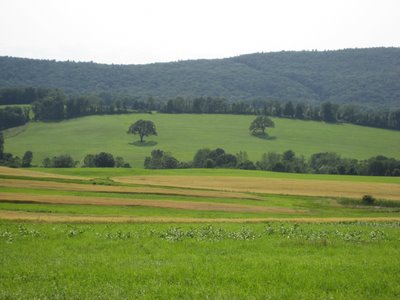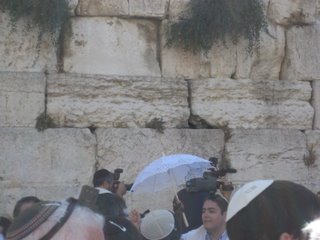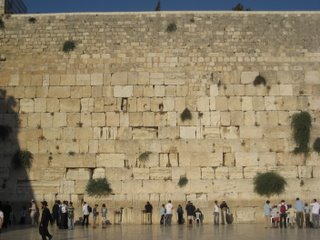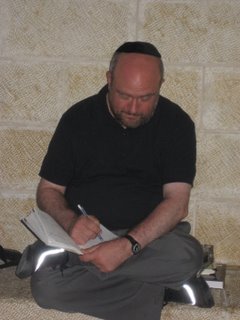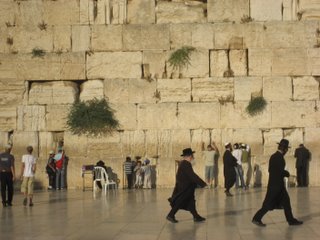Generally, fast days are meant to be days of Teshuva. Tisha B’Av is a day of mourning. But Teshuva is directly connected to staying the perpetual mourning . This is one meaning behind the saying that any generation that doesn’t see the Beit HaMikdash rebuilt, it s as if it was destroyed in their time. Having the Bet HaMikdash and feeling the closeness to
G-d that it generated is a matter of merit that comes through the hard work of repentance.
We, Avraham’s descendants, are like stars and sand. Grains of sand all blend together. Stars each shine alone. We must always combine our work on ourselves as individuals and as members of a nation. Some would say this is a matter of balance, but perhaps it needs to be more of a synthesis. Even on a day like today, when to some extent there is no I but only a we, we each naturally think of ourselves along with the greater whole.
I was thinking of keeping the following to myself. I’ve decided to share it. Statements about my being a servant of G-d or the like are statements of what I would like to be. Statements that seem harsh on myself make use of poetic license. The point here is not to paint myself in a virtuous light or the reverse, but to share a prayer.
Many people have a hard time connecting with the kinot, which are poems. These were written by human beings. Perhaps if we tried to write a kinah ourselves we would better relate to the day. Rabbi Soloveitchik (as quoted by Rabbi JJ Schachter) said that the fact that so many kinot use the Aleph Bet is a way of saying that really the pain is endless, but by using this structure the kinah can have a start and end. I hesitate to say this, but as a writer I disagree. Using the alphabet or acrostics are a way of getting out what is difficult to get out. You feel you can’t write anything at all but if you use the letters of your name or the letters of Tisha B’Av or of the Aleph Bet, all of a sudden it flows.
Originally I wrote this in Hebrew and, not yet being comfortable typing and posting n Hebrew, adapted it to English. I skipped X and Z because it seemed to me that it would be too forced to use those letters. If this was a lighter piece or a lighter day I would have used them. I hope this is of use to someone and fits with the theme of the day and the work we need to do. May we be blessed with full redemption right now today.
A Temple of holiness we lost.
A clarity of faith I lost.
Being clear as day; our guilt stands.
Being even clearer; I am not what I need to be.
Come and see how pleasant were our dwellings.
Come and see how I sit now on the Kotel floor.
Depleted of connection to G-d and to each other;
Depletion of connectedness inside my heart.
Each year, a year further from where we once were.
Especially me, I feel like less than I should be.
Foolish spies began our error.
Foolish I continue.
Going from land to land, we stay strangers.
Going no-where but my homeland, I feel a stranger.
Hearts bleed for Jewish blood flowing as water.
Heart and blood inside me are too cold.
In time comfort will do us well.
I see even now that the land s very good.
Jews will celebrate this day one day.
Jews, including me, await the holiday.
Kept dark, the Temple candles.
Kept dark, my heart’s constant candle.
Lest it be forever that you forget us.
Let it be stated that will always be your son.
Meals for our heart; your holy spirit.
My mealtime tonight; sitting fast with you.
Newly planted daily, Torah in our hearts.
Natah, my name means plant, I wish to grow.
One Torah, an elixir of life, you gave us.
Only from the poison power please save me.
Poor are what even our rich are.
Poor at the door, I am at your home.
Quiet. A muted nation.
Quite sad. I am speechless.
Righteous we are not, for we have sinned.
Rightful rulings I don’t seek, but kindness.
Saved for now, sanctification for future times.
Salvation and holiness reach me at last.
This nation awaits your return to us.
This me awaits my return to you.
Unwelcome war leads us to ask for peace.
Unwelcome hate causes me to seek love.
Virtuous and pure, you commanded us to be.
Verily, for the second, I am pure.
What is the purpose behind our nation’s pain?
When will I join my nation in salvation’s song?
You are one and your people are one.
Yours truly wants to be close to you and yours.


